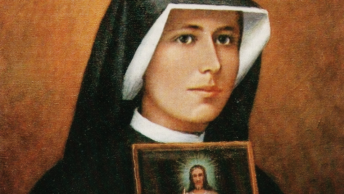One of the recurrent themes in the Diary of Saint Faustina Kowalska is certainly prayer. But what is prayer? How can we define it?
To begin with, prayer is a personal conversation with God. It implies two persons, the one who talks and the one who listens. Then the one who listens responds back to the one who has talked. Prayer implies that we stand before God. Obviously, to pray is not a mechanical act. On the contrary, it needs preparation. Hence, it is so important to come some time earlier to prepare oneself for prayer.
God is in the here and now. He fills the space of prayer. In him we move like fish in the ocean. Therefore, our response by the workings of grace is: Here I am Lord before you. It is important that we remember about God all the time. Consequently, it is so crucial to pray continually, always. When we do this we realise that we live in the awareness that God is within us. This is what St Faustina tells us in entry 486 of her Diary when she writes:
Jesus, when You come to me in Holy Communion, You who together with the Father and the Holy Spirit have deigned to dwell in the little heaven of my heart, I try to keep You company throughout the day, I do not leave You alone for even a moment. Although I am in the company of other people or with our wards, my heart is always united to Him. When I am asleep I offer Him every beat of my heart; when I awaken I immerse myself in Him without saying a word. When I awaken I adore the Holy Trinity for a short while and thank God for having deigned to give me yet another day, that the mystery of the incarnation of His Son may once more be repeated in me, and that once again His sorrowful Passion may unfold before my eyes. I then try to make it easier for Jesus to pass through me to other souls. I go everywhere with Jesus; His presence accompanies me everywhere.
Moreover, prayer can also be praying short prayers. In entries 161 and 162 of the Diary we have an excellent example of them:
February: God and the soul; silence. Victories 36, falls 3. Exclamatory Prayer: Jesus, I trust in You.
March: God and the soul; silence. Victories 51, falls 2. Exclamatory Prayer: Jesus, enkindle my heart with love.
April: God and the soul; silence. Victories 61, falls 4. Exclamatory Prayer: With God, I can do all things.
May: God and the soul; silence. Victories 92, falls 3. Exclamatory Prayer: In His Name is my strength.
June: God and the soul; silence. Victories 64, falls 1. Exclamatory Prayer: All for Jesus.
July: God and the soul; silence. Victories 62, falls 8. Exclamatory Prayer: Jesus, rest in my heart.
August: God and the soul; silence. Victories 88, falls 7. Exclamatory Prayer: Jesus, You know…
September: God and the soul; silence. Victories 99, falls 1. Exclamatory Prayer: Jesus, hide me in Your Heart.
October: God and the soul; silence. Victories 41, falls 3. Exclamatory Prayer: Mary, unite me with Jesus.
November: God and the soul; silence. Victories, falls. Exclamatory Prayer: O my Jesus, have mercy!
It helps a lot if, when we pray, we have a fixed place and time for prayer. Adding to this we direly need the attitude of humility. When the Holy Spirit predisposes us for prayer we start realizing and being aware of our singular dignity before God. Only a humble person can pray mercy to God. Let us not forget that it is those who know how to apologize really conquer heaven. In Diary entry number 440 St Faustina openly shows and admits her unworthiness in God’s sight. She says:
O my Creator and Lord, my entire being is Yours! Dispose of me according to Your divine pleasure and according to Your eternal plans and Your unfathomable mercy. May every soul know how good the Lord is; may no soul fear to commune intimately with the Lord; may no soul use unworthiness as an excuse, and may it never postpone [accepting] God’s invitations, for that is not pleasing to the Lord. There is no soul more wretched than I am, as I truly know myself, and I am astounded that divine Majesty stoops so low. O eternity, it seems to me that you are too short to extol [adequately] the infinite mercy of the Lord!
Prayer is an act of worship and thanksgiving. Prayer leads us to thank and worship God in every circumstance of our life. The person who does this lives in happiness and peace of heart. In Diary number 1661 Faustina writes: I spent the whole day in thanksgiving, and gratitude kept flooding my soul. O my God, how good You are, how great is Your mercy! You visit me with so many graces, me who am a most wretched speck of dust. Prostrating myself at Your feet, O Lord, I confess with a sincere heart that I have done nothing to deserve even the least of Your graces. It is in Your infinite goodness that You give Yourself to me so generously. Therefore, the greater the graces which my heart receives, the deeper it plunges itself in humility.
Let us remind ourselves that gratitude is the most important attitude which God cherishes in prayer. St Faustina was greatly aware of this. In fact, in entry 1367 of her Diary she wrote the most beautiful hymn of gratitude:
O my Lord, while calling to mind all Your blessings, in the presence of Your Most Sacred Heart, I have felt the need to be particularly grateful for so many graces and blessings from God. I want to plunge myself in thanksgiving before the Majesty of God and to continue in this prayer of thanksgiving for seven days and seven nights; and although I will outwardly carry out all my duties, my spirit will nonetheless stand continually before the Lord, and all my exercises will be imbued with the spirit of thanksgiving. Each evening, I will kneel for a half hour in my cell, alone with the Lord. As often as I shall awake at night, I shall steep myself in a prayer of thanksgiving. In this way I want to repay, at least in some small way, for the immensity of God’s blessings.
Prayer also entails that we give thanks to God for the difficult circumstances we have to face in life. St Faustina recounts to us the following experience: Once when I was suffering greatly, I left my work and escaped to Jesus and asked Him to give me His strength. After a very short prayer I returned to my work filled with enthusiasm and joy. Then, one of the sisters [probably Sister Justine] said to me, “You must have many consolations today, Sister; you look so radiant. Surely, God is giving you no suffering, but only consolations.” “You are greatly mistaken, Sister,” I answered, “for it is precisely when I suffer much that my joy is greater; and when I suffer less, my joy also is less.” However, that soul was letting me recognize that she does not understand what I was saying. I tried to explain to her that when we suffer much we have a great chance to show God that we love Him; but when we suffer little we have less occasion to show God our love; and when we do not suffer at all, our love is then neither great nor pure. By the grace of God, we can attain a point where suffering will become a delight to us, for love can work such things in pure souls (Diary, 303).
Another experience is to be found in entry 872 of the Diary. During the Holy Hour, the Lord allowed me to taste His Passion. I shared in the bitterness of the suffering that filled His soul to overflowing. Jesus gave me to understand how a soul should be faithful to prayer despite torments, dryness and temptations; because oftentimes the realization of God’s great plans depends mainly on such prayer. If we do not persevere in such prayer, we frustrate what the Lord wanted to do through us or within us. Let every soul remember these words: “And being in anguish, He prayed longer.” I always prolong such prayer as much as is in my power and in conformity with my duty.
From the most challenging experience of praying in moments of darkness, prayer also leads to worshipping God in his mercy. Hence, prayer is in fact the very light of the soul. In entry 1692 Faustina writes: My Lord and Creator, Your goodness encourages me to converse with You. Your mercy abolishes the chasm which separates the Creator from the creature. To converse with You, O Lord, is the delight of my heart. In You I find everything that my heart could desire. Here Your light illumines my mind, enabling it to know You more and more deeply. Here streams of graces flow down upon my heart. Here my soul draws eternal life. O my Lord and Creator, You alone, beyond all these gifts, give Your own self to me and unite Yourself intimately with Your miserable creature. Here, without searching for words, our hearts understand each other. Here, no one is able to interrupt our conversation. What I talk to You about, Jesus, is our secret, which creatures shall not know and Angels dare not ask about. These are secret acts of forgiveness, known only to Jesus and me; this is the mystery of His mercy, which embraces each soul separately. For this incomprehensible goodness of Yours, I adore You, O Lord and Creator, with all my heart and all my soul. And, although my worship is so little and poor, I am at peace because I know that You know it is sincere, however inadequate…
In her Diary, St Faustina teaches us that prayer essentially requires trust in God, which in its turn entails humility and contrition to the point of growing more and more in trust. In entry 1578 of her Diary Jesus himself tells her:
Let souls who are striving for perfection particularly adore My mercy, because the abundance of graces which I grant them flows from My mercy. I desire that these souls distinguish themselves by boundless trust in My mercy. I myself will attend to the sanctification of such souls. I will provide them with everything they will need to attain sanctity. The graces of My mercy are drawn by means of one vessel only, and that is-trust. The more a soul trusts, the more it will receive. Souls that trust boundlessly are a great comfort to Me, because I pour all the treasures of My graces into them. I rejoice that they ask for much, because it is My desire to give much, very much. On the other hand, I am sad when souls ask for little, when they narrow their hearts.
The attitude of trust is the very soul of prayer. Slowly, trust evolves into entrustment. No matter what state we are in our prayer life we are called to entrustment. That is why we all need to pray. St Faustina teaches us: A soul arms itself by prayer for all kinds of combat. In whatever state the soul may be, it ought to pray. A soul which is pure and beautiful must pray, or else it will lose its beauty; a soul which is striving after this purity must pray, or else it will never attain it; a soul which is newly converted must pray, or else it will fall again; a sinful soul, plunged in sins, must pray so that it might rise again. There is no soul which is not bound to pray, for every single grace comes to the soul through prayer (Diary, 146).
Hence, St Faustina’s Diary amply shows us that prayer is for everybody. It is only by prayer that the Spirit of God can truly live and act in and through us for others.








